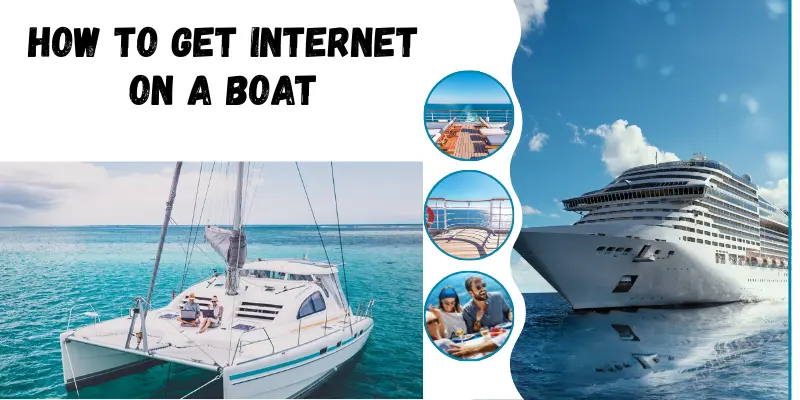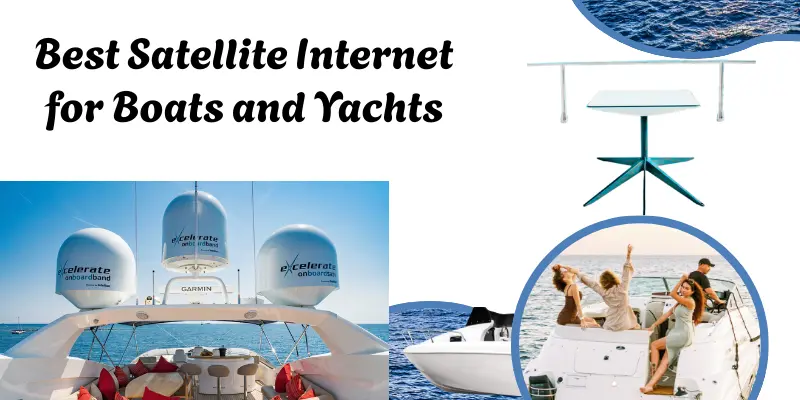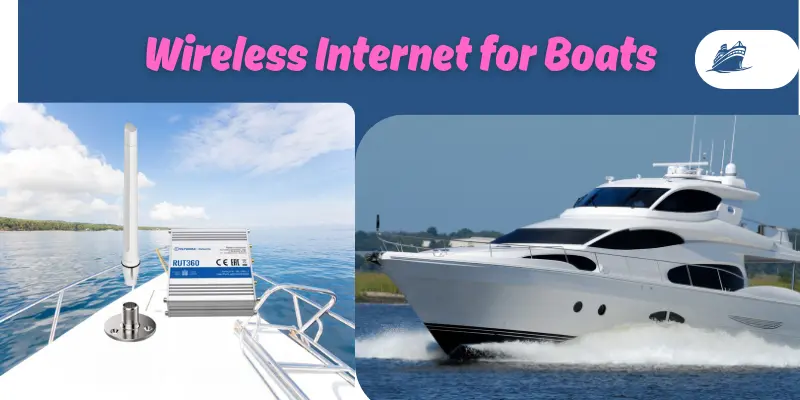Satellite Internet Boat – Stay Connected on the Open Sea
Published: 17/04/2025
Satellite Internet Boat lets you stay connected even when you are far out at sea. It uses satellites to give internet on boats where normal mobile signals do not reach. People on fishing boats, cruise ships, or private yachts can use it for calling, sending messages, watching maps, or even streaming videos. Now, staying online on water is easy and helpful.
Table of Contents
How to Get Internet on a Boat
Getting internet on a boat is easy if you use the right tools. First, you need a Satellite antenna. This antenna catches signals from the sky. Next, you connect the antenna to a modem and a WiFi router.

These things help you use internet on phones, tablets, or laptops. Some boats also use mobile WiFi when they are close to land. But for the open sea, satellite internet is the best. It works far from the shore and gives better signal in deep water. With the right setup, you can stay online while sailing anywhere.
Types of Satellite Internet Boat
There are different types of satellite internet systems made for boats. Each one works in a special way and is made for different needs. Here are the main types.
- VSAT (Very Small Aperture Terminal)
- L-Band Satellite Systems
- Flat Panel Satellite Systems
- Mobile Satellite Terminals
Each type has its own pros and cons. Boat owners choose the type that fits their travel, boat size, and internet needs.
Best Satellite Internet for Boats and Yachts
here are the top options for satellite internet on boats and yachts.

- Starlink Maritime
- Inmarsat FleetBroadband
- Iridium Certus
- KVH TracPhone
- VSAT Systems
- Global Xpress (Inmarsat)
Cheap Satellite Internet at Sea
Here are some affordable options for satellite internet on boats.
- Iridium GO
- Globalstar Sat-Fi2
- Thuraya SatSleeve
- Inmarsat IsatHub
- Mobile Satellite Hotspots
Wireless Internet for Boats
Wireless internet for boats lets you stay connected without the need for complex satellite setups. Here are the main options for wireless internet on a boat:

- Wi-Fi Extenders
- These devices pick up Wi-Fi signals from nearby marinas or coastal hotspots and extend them to your boat, offering a cost-effective solution if you’re close to shore.
- Mobile Hotspots
- Using cellular data, mobile hotspots can provide internet access when you’re within range of a cellular network. These are simple to use and often affordable.
- Marine Wi-Fi Systems
- Designed for boats, these systems offer a stronger and more stable connection, especially in coastal areas. They can link to local Wi-Fi networks or use cellular towers for connection.
- Satellite Wi-Fi Systems
- A hybrid solution combining satellite and Wi-Fi technology, offering internet on your boat wherever you go, especially when you’re far from land.
- Hotspot Routers for Boats
- A small portable router can connect to your cellular network or satellite internet, allowing multiple devices to access the internet at once.
Marine Satellite Internet and TV Together
Combining Satellite Internet and TV on a boat offers the perfect entertainment and communication solution at sea. Here’s how you can enjoy both together:
- All-in-One Systems
- Some marine satellite systems offer bundled packages that provide both internet and TV services. This means you can stream shows, check emails, and browse the web without needing separate setups.
- Satellite Dish and Receiver
- A marine satellite dish can be installed to catch satellite signals for both internet and TV. The dish automatically tracks satellites as the boat moves, ensuring stable connections for streaming and browsing.
- Entertainment and Work Simultaneously
- These systems let you enjoy live TV broadcasts while staying connected online. Whether you’re working remotely or relaxing, you can enjoy the best of both worlds.
- Flexibility in Packages
- Many satellite service providers offer flexible packages where you can choose the amount of data for internet usage and the channels for TV. This makes it easier to control costs based on your needs.
- Reliable Coverage at Sea
- With marine satellite internet and TV systems, you can stay connected even when you’re far from land. It ensures continuous access to entertainment, news, and the web, no matter where you are on the ocean.
Marine Internet: Setup and Installation
Setting up internet on a boat or yacht involves choosing the right system and installing it correctly for smooth operation. Here’s a step-by-step guide to setting up marine internet:
- Step 1: Choose the Right System
- Decide on the internet system based on your boat’s size, your internet needs, and your budget. Options include satellite systems, mobile hotspots, or Wi-Fi extenders.
- Step 2: Install the Antenna or Dish
- Most satellite systems require a dish or antenna. Choose a location on the boat with a clear view of the sky, preferably high up and free of obstructions. The dish must be securely mounted to avoid movement.
- Step 3: Mount the Router and Modem
- After installing the satellite dish, the modem and router need to be connected to provide internet throughout the boat. These devices can often be placed inside the boat, near the main living area for easy access.
- Step 4: Connect Power Supply
- The internet system requires power, so ensure your boat’s power supply is stable. Most systems use 12V DC power, but some might need 110V AC power depending on the setup.
- Step 5: Test the Connection
- Once everything is installed, test the system. Make sure the dish is correctly aligned and the internet is working properly. You may need to adjust the dish or antenna slightly to get the best signal.
- Step 6: Set Up Wi-Fi Network
- If you’re using a router, set up a secure Wi-Fi network. This allows you to connect all your devices, like smartphones, laptops, and tablets, to the internet wirelessly.
- Step 7: Monitor and Maintain the System
- Regularly check the system to ensure it’s working correctly. Clean the antenna or dish and make sure no wires are damaged. Some systems offer remote monitoring for easy troubleshooting.
Future of Maritime Internet
The future of maritime internet is moving toward faster, smarter, and more reliable technology. As boats and yachts travel farther, the need for better connectivity at sea is growing rapidly. Here’s what the future looks like:

- Global High-Speed Coverage
- Smarter Satellite Systems
- Better Data Plans
- Streaming and Remote Work at Sea
- Integrated Marine Technology
- Eco-Friendly Designs
Advantages and Disadvantages of Satellite Internet for Boats
Satellite internet for boats offers strong connectivity at sea but comes with both helpful benefits and some challenges.
Benefits of Satellite Internet for Boats
Satellite internet for boats offers non-stop connectivity across oceans, keeping you online even far from land.
| Pros of Satellite Internet Boat |
|---|
|
Drawbacks of Satellite Internet for Boats
Satellite internet for boats offers wide coverage, but it also comes with some important drawbacks to consider.
| Cons of Satellite Internet Boat |
|---|
|
Common FAQs about Satellite Internet Boat
Here are some fresh and useful answers to common questions about satellite internet on boats.
Not always. Smaller boats close to land can use Wi-Fi extenders or mobile hotspots instead.
Yes, but only with strong satellite or 4G LTE marine systems. Weak signals may cause lag.
Some providers offer flexible plans or seasonal pause options to save money.
Signal strength can drop during heavy rain or storms, though high-quality systems handle this better.
It depends on your router and internet plan. Some systems support up to 10+ devices.
Yes, if you use a protected network with a password and basic encryption.
Conclusion
Satellite internet for boats brings powerful connectivity to the open sea, making life onboard smarter, safer, and more connected than ever. Choosing the right system means balancing coverage, cost, and your boating needs so you can sail with peace of mind and stay online wherever your journey takes you.

- Be Respectful
- Stay Relevant
- Stay Positive
- True Feedback
- Encourage Discussion
- Avoid Spamming
- No Fake News
- Don't Copy-Paste
- No Personal Attacks

- Be Respectful
- Stay Relevant
- Stay Positive
- True Feedback
- Encourage Discussion
- Avoid Spamming
- No Fake News
- Don't Copy-Paste
- No Personal Attacks





